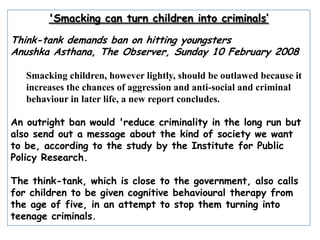
Smacking
- 1. 'Smacking can turn children into criminals‘ Think-tank demands ban on hitting youngsters AnushkaAsthana, The Observer, Sunday 10 February 2008 Smacking children, however lightly, should be outlawed because it increases the chances of aggression and anti-social and criminal behaviour in later life, a new report concludes. An outright ban would 'reduce criminality in the long run but also send out a message about the kind of society we want to be, according to the study by the Institute for Public Policy Research. The think-tank, which is close to the government, also calls for children to be given cognitive behavioural therapy from the age of five, in an attempt to stop them turning into teenage criminals.
- 2. 'The evidence shows that the most prolific criminals start offending between the ages of 10 and 13,' said Julia Margo, associate director at IPPR and author of Make Me A Criminal, Preventing Youth Crime. 'You need to deal with the problem before it manifests. The biggest risk factor is not their behaviour, but their parents.‘ Instead of punishing young children with anti-social behaviour orders, specialists should look into whether their parents were condoning delinquent behaviour, Margo argued. She called for 'sure start plus' centres for children aged five to 12, through which parenting classes, one-to-one reading sessions and counselling could be carried out.
- 3. But Margo said a total ban on smacking would also reduce the number of children turning to crime. 'There is a lot of evidence that children who are smacked regularly - once a week - are more likely to develop aggressive personality disorder,' said Margo. 'Hitting a child teaches them to act out on emotional impulses. We need to give out the message that children should be nurtured and taught to manage their behaviour. We should ban corporal punishment properly.‘ It is currently not lawful for a parent to smack a child if it leaves a bruise but a lighter smack or 'reasonable chastisement' is allowed.
- 4. It is a policy that many doctors oppose. 'This is an extremely important report,' said Rosalyn Proops, the child protection officer at the Royal College of Paediatrics and Child Health. 'Like all people, paediatricians have a variety of opinions. However, the majority believe that all forms of smacking are an assault of a child and should not take place.‘ But others argued that making smacking illegal would be unfair on those parents who did not know how else to punish their children. Alex Griffiths, an educational psychologist, said any ban would have to be met with an educational programme: 'My worry is that before it can be made illegal parents need realistic alternatives as to how they should handle their children. Otherwise, a large group of people, whose children are out of control, will be left with no sanctions whatsoever.‘
- 5. Parents, meanwhile, congratulated the government for not banning smacking completely. Andy Hibberd, co-founder of the Parent Organisation, said: 'If you can reason with a child in any other way then you should. But can you reason with a two-year-old who is reaching for a hot pan? Parents should be able to use a smack as a sanction - not in a way that will injure a child. Sometimes a short, sharp slap is a reminder to the child.‘ A spokeswoman for the Department for Schools and Families said they were not prepared to change the laws on smacking, arguing that violence against a child was illegal but decent parents should not be criminalised.
- 6. “Beyond Anti-Smacking” Rethinking parent–child relations Julie Brownlie Stirling University Simon Anderson Scottish Centre for Social Research, Edinburgh Recently, it has been argued that ‘anti-smacking’ campaigns have been so successful that ‘explicit pro-smackers’ are now thin on the ground. Yet the use of physical chastisement remains widespread. One response to this contradiction is to focus less on parents and more on children's rights.
- 7. In this article, however, the authors draw on data from a recent Scottish study of parents’ views of physical chastisement to answer the following question: If the starting point for parents in thinking about physical chastisement is not children's rights, why is this the case and what are the implications for moving the debate forward? Drawing on a more dialogical understanding of parent–child relations and recent sociological work on childhood, we conclude that while future campaigns against physical chastisement need to be shaped by a children's rights perspective, they also need to be informed by understandings of the parent–child relationship and the meaning(s) disciplining has for parents within that relationship.
